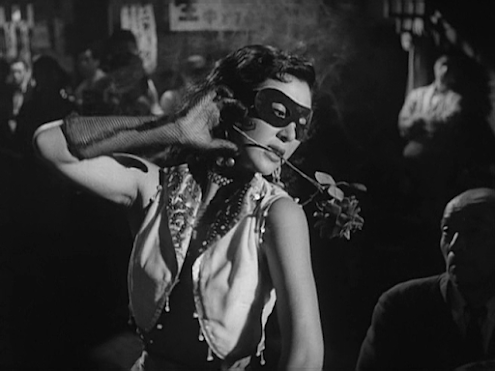Obscure Japanese Film #28

Left to right: Jun Tatara, Daisuke Kato and Eijro Tono
Depicting
the shattered dreams of a disparate range of characters struggling to survive
in the chaos of post-war Japan, Tomu Uchida’s second film after a hiatus of
over a decade spent in exile may well be his most personal work. Twilight Saloon takes place entirely
inside a bar during the course of one day from the start of business until
closing time. Entertainment is provided by veteran pianist Eto and his young
singer and protégé, Kenichi (played respectively by real-life musicians Hiroshi
Ono and Takuya Miyahara in their only film roles). Both are down on their luck,
as is stripper Emy Rosa (Keiko Tsushima), who began her career as a
ballet dancer, but now provides the bar’s most popular part of the show.

Keiko Tsushima
Meanwhile, waitress and singer Yuki (Hitomi Nozoe, star of Yasuzo Masumura’s Giants and Toys) loves Masumi (Ken Utsui) but has unfortunately attracted the attention of yakuza Morimoto (Tetsuro Tanba), who won’t take no for an answer.

Hitomi Nozoe

Tetsuro Tanba (seated) and Ken Utsui (right). Takuya Miyahara and Hitomi Nozoe are in the back ground.
Other customers include a group of beret-wearing pseudo-intellectual beatniks who prattle about existentialism, and gambler and ex-soldier Kibe (Daisuke Kato), who is surprised when his former commander, Colonel Otsuka aka ‘The Demon’ (Eijiro Tono), walks in. Otsuka is an embittered man who claims to be working as a real-estate broker but is clearly short on funds. However, the most important character is Umeda, a regular who used to be a painter but now makes a living of sorts playing pachinko. From his usual stool at the end of the bar, Umeda regards the tragedies that unfold around him with kindness and pity and is quick to help those in need when he can.
 |
| Isamu Kosugi |
Umeda is memorably played by Isamu Kosugi,[1] star of many of Uchida’s pre-war films, in his only appearance in the director’s post-war work. The character must have had a great deal of resonance for both star and director – at one point, he talks of how he gave up painting due to feelings of guilt for having glorified war in his work. Kosugi had appeared in a number of propaganda films during the war years, while in 1942 Uchida went to China to work for the Manchukuo Film Association, a company which produced mainly pro-Japanese propaganda. Although Uchida apparently never completed a film for the company himself, it is clear that he later regarded this decision as a grave error of judgement on his part. Towards the end of Twilight Saloon, Umeda tells the pianist Eto, ‘We have to overcome resentment and sorrow,’ which I suspect was the main message that Uchida wished to convey in this film.
Despite the unlikely incongruity of a bar offering an entertainment programme which begins with opera and ends in a strip show, the film has much to recommend it. Uchida's co-ordination of the many characters and story threads is impressive, as is his use of a single set, which he inventively exploits to maximum advantage. The way in which major characters continue to do their thing in the background while the focus is on somebody else is especially good. One bizarre highlight is Kenichi’s rendition of ‘The Toreador Song’ from Bizet’s Carmen, during which Umeda and the bar’s resident freeloader Kurishima, aka ‘Suckerfish’ (Jun Tatara), break into a spontaneous dance with Umeda as the toreador and Suckerfish as the bull.
 |
| Isamu Kosugi and Jun Tatara |
The screenplay of Twilight Saloon is by Senzo Nada, a name with no other credits on IMDb. Tempting as it is to conclude that this is Uchida working under a pseudonym, the evidence refutes this; as David Baldwin has pointed out in his piece on his Uchida website (see below), Nada does have a few other credits on the Japanese Movie Database. Furthermore, when I dug a little deeper, I found information suggesting that Nada had been a novice screenwriter at the time and that his script somehow found its way to Uchida, with whom it obviously struck a chord. How much the director may have altered it is, of course, anyone’s guess. Nada also wrote for television and a collection of his screenplays was published in 1986. One Japanese source states that he was born in 1931 and died in 1985, while another (probably more reliable) gives his date of birth as 1918, but seems to agree with the year of death. I also found a list of TV credits for Nada, which include a new adaptation of Twilight Saloon made in 1961 and running 45 minutes; the following year, Uchida directed a TV adaptation of his 1939 film Earth, for which he employed Nada to write the script.
For more on Twilight Saloon and Tomu Uchida, please visit http://www.uchidatomu.com/twilight-saloon-tasogare-sakaba-1955/
[1] Kosugi became a director of B-movies after the war while continuing his acting career.
Thanks for mentioning my site and for filling me in about Senzo Nada. Your scholarship is always appreciated.
ReplyDelete